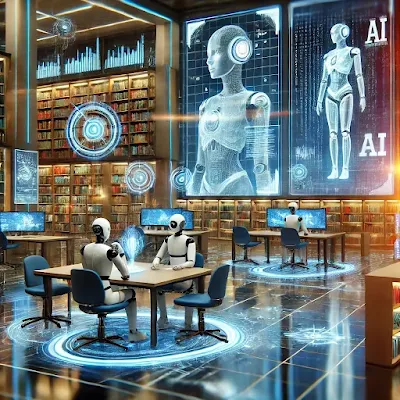Summary of "Defining Artificial Intelligence for Librarians"
By Andrew M. Cox & Suvodeep Mazumdar
Journal of Librarianship and Information Science, 2024, Vol. 56(2) 330–340
Introduction
Artificial Intelligence (AI) is reshaping multiple industries, including libraries. This summary of the article by Cox and Mazumdar highlights key insights on how AI can redefine librarianship by automating processes, enhancing services, and addressing ethical challenges. The focus is on providing librarians with a strategic understanding of AI's role rather than a technical deep dive. The authors also address how AI impacts equality, diversity, and inclusion in the profession.
What is AI?
AI refers to technologies that perform tasks typically requiring human intelligence, such as decision-making, learning, and problem-solving. The authors review formal definitions of AI, emphasizing its reliance on data, algorithms, and computing power. They highlight how AI simulates human-like capabilities like perception and reasoning while stressing its limitations and potential biases.
AI Technologies Explained
Several technologies underpin AI, each with specific applications for libraries:
- Machine Learning: AI models learn patterns from data to make predictions or decisions. This involves supervised learning (training with labeled data), unsupervised learning (identifying patterns in unlabeled data), and reinforcement learning (learning through trial and error).
- Natural Language Processing (NLP): Enables AI to analyze and generate text. Applications include transcription, sentiment analysis, and automated indexing.
- Image and Video Processing: AI can analyze images or videos for object recognition, enabling better cataloging of visual materials.
- Robotics: In libraries, robotics may assist with sorting, retrieval, and user interactions, blending physical and AI-driven capabilities.
Key Use Cases of AI in Libraries
The article identifies five distinct AI applications in libraries, each addressing different aspects of library operations:
- Backend Processes: Automating routine administrative tasks with Robotic Process Automation (RPA) or utilizing Automated Storage and Retrieval Systems (ASRS) for efficient space management. These technologies reduce manual effort and free librarians to focus on higher-value activities.
- User Services: AI enhances user experiences through personalized search, recommendations, and digital assistants (e.g., chatbots). Living systematic reviews, supported by AI, enable health and academic libraries to manage the growing volume of research efficiently.
- Supporting Data Science Communities: Libraries can act as hubs for data stewardship, offering expertise in data curation, licensing, and preservation. This fosters interdisciplinary collaboration and strengthens the library's role in digital humanities and research.
- Data and AI Literacy: Expanding traditional information literacy programs to include AI literacy. Libraries can educate users on how AI impacts their lives and information consumption, ensuring ethical and informed use.
- User Data Analysis: Libraries can use AI to analyze user behavior, predict trends, and improve services. Ethical considerations, such as privacy and consent, are critical in this domain.
Opportunities and Challenges
AI offers transformative potential for libraries but also poses significant challenges:
- Opportunities: Enhanced efficiency, personalized user experiences, better resource management, and new roles for librarians in AI-driven initiatives.
- Challenges: High implementation costs, ethical concerns (e.g., data bias, privacy issues), and a lack of standardized tools. Additionally, integrating AI into library workflows requires upskilling staff and navigating resistance to change.
Ethical Implications and EDI (Equality, Diversity, and Inclusion)
The authors caution against viewing AI as neutral. AI systems often reflect societal biases, potentially reinforcing inequalities. For example, AI development is dominated by white male perspectives, which may influence its design and outcomes. To address this, libraries must:
- Promote inclusive AI literacy programs.
- Ensure diverse representation in AI-related roles.
- Adopt ethical data governance practices.
Impact on Librarianship
AI will not replace librarians but will reshape their roles. As information landscapes become more complex, librarians' expertise in managing, curating, and interpreting data remains essential. However, the profession must adapt by acquiring new technical skills and embracing interdisciplinary collaboration.
Conclusion
AI presents both challenges and opportunities for libraries. By leveraging AI responsibly, libraries can enhance their services, support diverse communities, and maintain their role as vital knowledge hubs. However, this requires proactive engagement with ethical issues, strategic investments in technology, and ongoing professional development.



